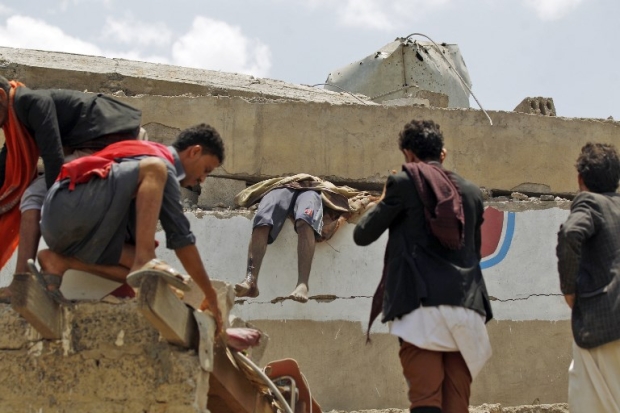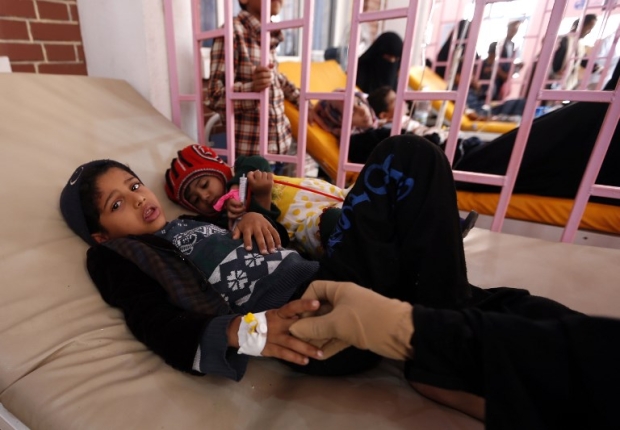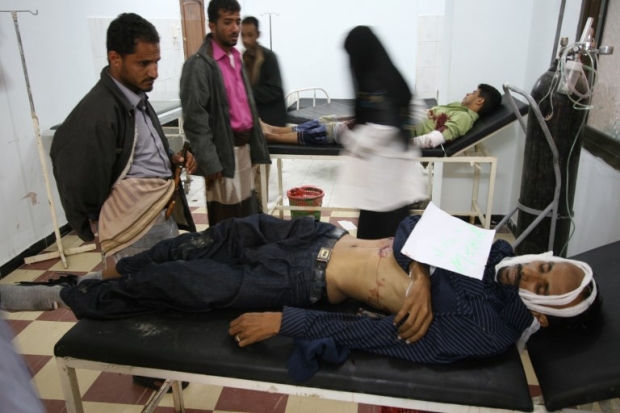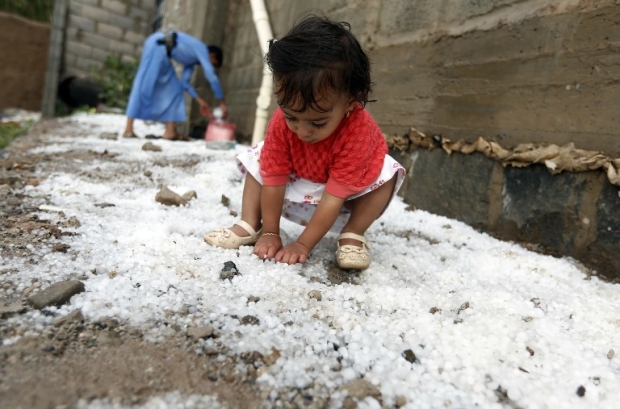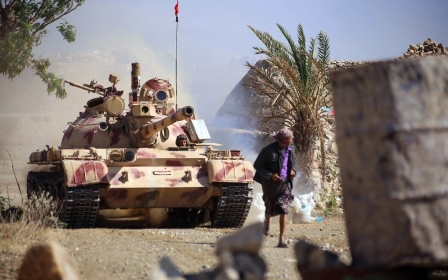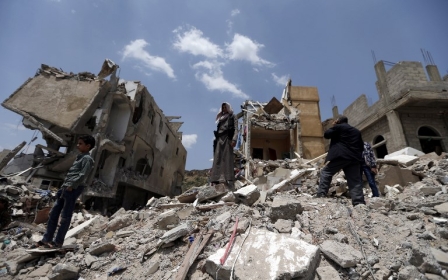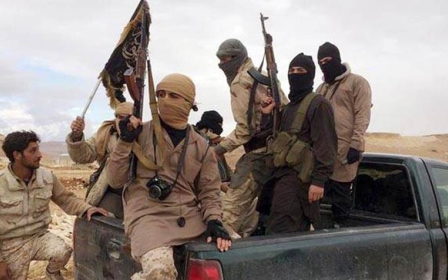Taiz torment: No surgeon for Yemeni children wounded by rebel shells
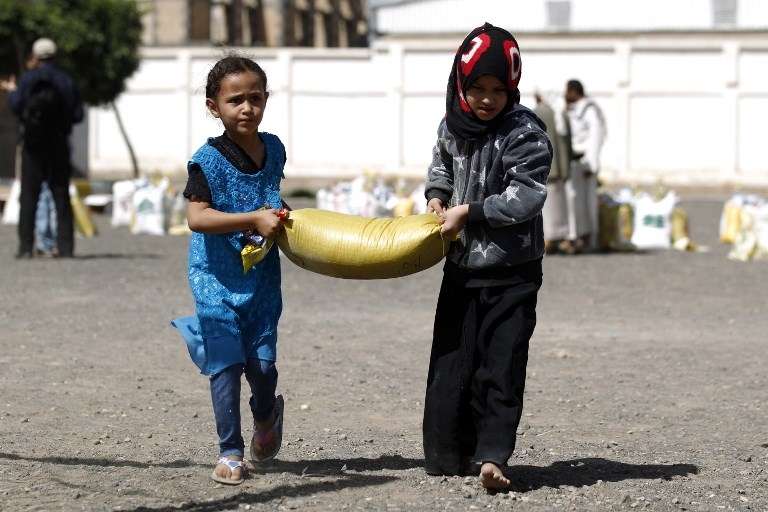
TAIZ, Yemen - After Friday prayers last week, Maram Noaman, 13, left her house to play with her friends in the neighborhood of Souk al-Samil in the heart of Taiz City.
Although she normally returned home safely every afternoon, this time, Houthi shelling targeted the little girl along with her friends as they played in the street.
"While I sat chewing qat [a mild narcotic] at my house, I heard the shelling in the street and the voices of people screaming. I ran out to see what had happened,” Maram’s father, Thabet Noaman, told Middle East Eye.
“I was utterly shocked. I found my daughter and the other children strewn across the road all covered in blood," he said.
As Thabet ran to identify the children, he realised that three of them had already lost their lives. The other nine - including his daughter Maram - were severely wounded and in need of urgent medical attention.
There wasn’t a single vascular surgeon at the hospital or in the whole of Taiz for that matter
- Thabet Noaman, Taiz resident
Along with some of his neighbours, Thabet rushed the children to the largest hospital in Taiz, the state-run al-Thawra Hospital. Despite being the best equipped among the city’s health-care facilities, al-Thawra still suffers a shortage in doctors and a tight budget.
Recounting his journey there he said: "I will never forget the sound of those children crying and their mothers screaming in desperation. They were such horrendous moments.”
“There wasn’t a single vascular surgeon at the hospital or in the whole of Taiz for that matter,” said Thabet in tears.
Vascular surgeons are specialists trained to treat vascular injuries. In the case of an accident – or in Maram’s case, an attack - where a patient’s vessels have been ruptured, vascular surgeons are required to treat the victims. Because of the high level of training they require however, vascular surgeons are not available at all hospitals, even in first-world countries.
The city is largely in the hands of the Saudi-backed government but has been a key battlefield in the conflict that has gripped Yemen since March 2015 as Houthi rebels hold much of the surrounding countryside.
More than 10,000 people have been killed in Yemen since the coalition intervened in March 2015, including at least 1,500 children.
'No vascular surgeons'
Although Maram underwent two operations to remove the shrapnel, the lack of a vascular surgeon left her in a critical condition afterwards. And since returning home a few days later, Maram has continued to suffer from her injuries.
“She needs another operation to be conducted by a vascular specialist, otherwise she faces the possibility of suffering life-long complications and even disabilities,” her father said.
I could not believe that the shelling had actually killed my son. I can do nothing but pray that Allah avenges my innocent son
- Murad Yasin, Taiz resident
Although there some vascular surgeons in Aden and Sanaa, a lack of medical supplies and facilities across the country makes any complicated treatment less likely to be successful.
The only way Thabet can guarantee Maram’s full recovery is by taking her abroad. But he does not have the money to make that happen.
"I spent all the money I had on hospital fees and medication. I cannot afford to take Maram abroad.
"The only hope I have at this point is that a philanthropist or [charity] organisation will offer to pay for the expenses of her treatment.”
Luckier than others
While Maram and her family were lucky that she survived the attack, the family of eight-year-old Mohammed Yassin, one of the three children who were killed in the Friday shelling, has been struggling to cope.
Mohamed’s father Murad Yassin told MEE: "We usually hear the shelling in our neighborhood, so when I heard it on Friday, I thought it was just a random house that had been hit.”
“I could not believe that the shelling had actually killed my son. I can do nothing but pray that Allah avenges my innocent son,” added Murad as he sobbed.
We cannot turn a blind eye on the rising number of civilians injured or killed as a result of indiscriminate attacks in Yemen's conflict
- Robert Mardini, ICRC regional director
Friday's attack was only one of a series of attacks that have targeted civilians in Taiz since March 2015. On Monday, Houthi shelling targeted a house in the al-Jahmalya neighborhood, killing four children and wounding others.
In a statement on Sunday, the International Committee of the Red Cross (ICRC) deplored the civilian casualties that resulted from the Friday shelling.
"We cannot turn a blind eye to the rising number of civilians injured or killed as a result of indiscriminate attacks in Yemen's conflict,” Robert Mardini, ICRC's regional director for the Near and Middle East, said in the statement.
“Too often in recent months, civilians - women, men and children - have been in harm's way, becoming victims of shells and bombs."
Mardini urged all warring sides to take “every precaution to spare civilians”, adding that what happened on Friday was “yet another stark reminder of the immense suffering that civilians across Yemen are enduring in their daily lives.”
Lack of doctors
A chronic shortage of medical specialists has exacerbated the impact on civilians of the conflict, with many of the limited number of surgeons in the country leaving because of the war.
As a lot of resources and funding are needed to train doctors, most surgeons in Yemen have been foreigners or trained abroad.
According to a report by the WHO's Yemen branch, most of the 1,200 non-Yemeni health practitioners who were working in Yemen have left the country since the start of a Saudi-led bombing campaign in March 2015.
At the same time, the escalating violence in Taiz City has forced most of the city’s hospitals to close down, with medical services across Yemen reaching a critical state as hundreds of health facilities have stopped functioning amid air strikes, shelling, lack of supplies and inadequate funding or staff.
"Taiz is in dire need of surgeons and doctors, but there are many obstacles that prevent them from returning - the main one being the ongoing war," Samei said.
According to Samei: "There were only two vascular surgeons in Taiz before the war. They left in 2015, leaving the city in dire need of cardiac and vascular specialists.”
Some of those injured, including the children, have ended up dead because their families could not find them the medical attention they need
- Ahmed Sohaibi, Coalition of Humanitarian Relief
While many international NGOs working in Taiz and across Yemen provide hospitals with medical supplies, none have been able to resolve the issue of medical staff, sources told MEE.
"INGOs provide hospitals with medicines but not doctors. We need organisations to set up medical camps that bring doctors into Taiz," said Ahmed al-Sohaibi, spokesperson of the Coalition of the Humanitarian Relief (CHR) in Taiz, an umbrella organisation for 200 associations and aid groups working in Yemen.
Those that are in critical condition have to leave Taiz towards Aden or outside Yemen altogether in order to receive proper health care, he said.
"Some of those injured, including the children, have ended up dead because their families could not find them the medical attention they needed. Others are suffering permanent disabilities for the same reason."
“The few who manage to travel abroad do so with the limited help of INGOs,” Sohaibi added.
Both sides to blame
According to the latest report from the UN Human Rights Office (OHCHR) published on 5 September, violations and abuses continue unabated in Yemen, along with unrelenting violations of international humanitarian law. This has left civilians suffering the consequences of an "entirely man-made catastrophe."
According to the report: "Between March 2015 and 30 August, at least 5,144 civilians have been documented as killed and more than 8,749 injured. Children accounted for 1,184 of those who were killed and 1,592 of those injured.”
Houthi shelling and landmines kill children, and the pro-Hadi government does nothing to help the victims. Both are sinful of killing Taiz children
- Ahmed al-Sohaibi, Coalition of Humanitarian Relief
While the report said that Saudi-led coalition airstrikes continue to be the leading cause of children and overall civilian casualties – 3,233 of the civilians killed were reportedly killed by coalition forces according to the UN OHCHR report – locals say both the Houthis and the coalition are to blame.
According to the UN report, “The shelling of Taiz has been unrelenting, even after the impact of these attacks on civilians and civilian objects became apparent to the parties involved.”
“The use of such tactics appears to be in violation of the prohibition of indiscriminate attacks and of the obligation to take all feasible precautions to protect civilians and civilian objects,” added the report.
Thabet, Maram’s father, hopes that the warring sides will stop the violence and give children, including his daughter Maram, a chance at experiencing a normal childhood.
"After schools and parks in Taiz were shut down by the war, children have been playing on the streets – but even they are unsafe.
“The war has affected everyone, but children are the most vulnerable victims."
This article is available in French on Middle East Eye French edition.
New MEE newsletter: Jerusalem Dispatch
Sign up to get the latest insights and analysis on Israel-Palestine, alongside Turkey Unpacked and other MEE newsletters
Middle East Eye delivers independent and unrivalled coverage and analysis of the Middle East, North Africa and beyond. To learn more about republishing this content and the associated fees, please fill out this form. More about MEE can be found here.


